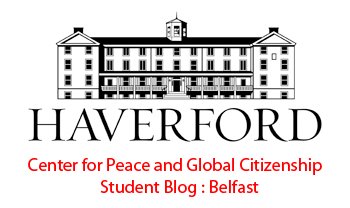Although this internship and my involvement in it has been designed to be strictly secular, I myself come from a strong Catholic background and thus it's interesting to acknowledge the conflation of how religion has been incorporated in my own life with how religion has evolved in Northern Ireland into a prime source of difference, a projected structure that is quite unlike its original meaning. I found one of the sermons at a mass I attended to be particularly reflective and appropriate for the context of my internship; it addressed the issue of sacrifice, asking us to reflect upon how often in our lifetimes we completely and wholeheartedly put
the needs of others before our own and consider the happiness of others more than our own selves; the "completely" aspect really hit me, as I realized that despite all of the various projects and activities with which I've been involved during my internship, I can still recall moments when I would not be actively conscious of my presence in Belfast. I suppose this could be attributed to the fact that Belfast, in reality, isn't the blatant warzone that it was ten years ago. Thus, if I were merely a tourist, I probably wouldn't notice any conflict whatsoever, but because I am entwined with a multitude of people from here in terms of my internship as well as in terms of personal relationships, I of course realize that there's so much more than meets the eye. Furthermore, I mentioned to someone from Hazelwood that one of the boys from my Crossing the Atlantic group was absolutely wonderful and yet sometimes seemed reserved and distant. She informed me that this personality has been accounted for by the fact that he'd seen his own father murdered right in front of him during the Troubles. I immediately felt extraordinarily guilty for anytime when I let slip in my mind the broad extent of the conflict in Belfast, thinking that it's not that bad after all or unconsciously distracted by my own petty, insignificant concerns such as homesickness or desire to travel.. although, I don't really know what more I could've done in that particular situation.. I just wish that I could do more, could more wholeheartedly and completely commit myself to helping them, because they're the ones who have to deal with the aftermath every single day of their lives even if the Troubles are "over".. and they're the ones who, as cliché as it may sound, have the power, position, and potential to make a difference for the future.
Today I started my work at the CEP, Community Empowerment Partnership, in Belfast; unlike Hazelwood, it does not have protective walls and an idealistic atmosphere (literally and figuratively, though I realized that cross-community groups and activities are just as important in integrated schools since the children tend to resort back to their own communities and coerced societal positions once they leave school.. something I wasn't conscious of while at Hazelwood). I worked with a very kind and engaged youthworker; he is a member of the (no longer militaristic) IRA/Sinn Féin and was held in the Maze Prison for five years during the Troubles. The group is thus naturally a Catholic youth empowerment group, but the CEP does work with Protestant children as well and is working towards creating cross-community groups. As my co-worker articulated though, it is difficult to force integration upon people and such integration requires an extensive amount of time and patience. I asked him whether he thought the situation in Belfast is
similar to racism and the "black-white" conflict in the states, to which he replied that it's the same and yet not the same. He reiterated that which I've already recognized: it is a bit more complex in Northern Ireland due to the various variables aside from the foremost religious differentiation, but there is a similarity in terms of the repression of Catholics
social-structurally. One such example of this is the unemployment rate in Northern Ireland, that in being that Catholics are twice as likely to be unemployed than Protestants; they also more often frequent prisons. Thus, the group of kids today were all Catholic, and he admitted that if you questioned their perceptions and opinions of Protestants, they'd tell you upfront that they hated them. I appreciated his honesty and realized that the solution is not as easy as merely having both sides work together in various teambuilding activities; rather, it's quite necessary to first fortify the foundation with a sense of unity and empowerment within each individual group, particularly the Catholic youths who, judging by my perceptions and especially by the current suicide tragedy of Catholic youths in Northern Ireland, seem to have
suffered the most.
Today, we went caving and then canoeing; the
caving was especially effective, as the kids had to physically and verbally work together to transgress through the caves (which entailed squeezing through small, tight spaces; climbing vertically; and twisting the body in inconceivable ways to find our way out safely!) I could tell that overall they really are good kids, but some tended to have discipline and anger-management issues; I hope to help my co-worker these upcoming weeks break through these barriers that some of the kids have chosen to posit and perhaps aid in disintegrating them. The next few days we'll be doing various other teamwork and communication activities; this youth group is additionally a means of keeping the Catholic kids off of the streets as well as providing for them
an alternative, positive image within their own community so as to impact their future decisions in their, hopefully, cross-communities.








































.jpg)














